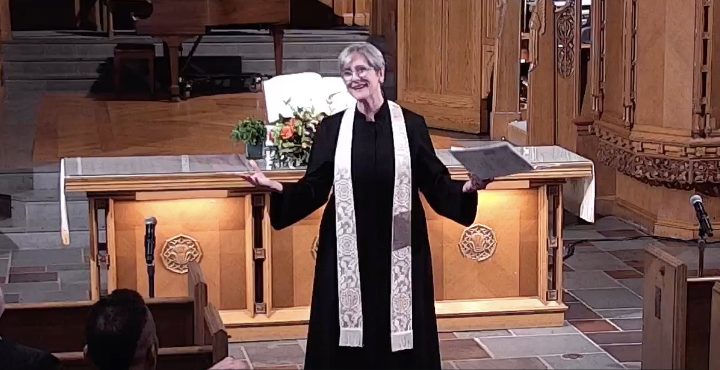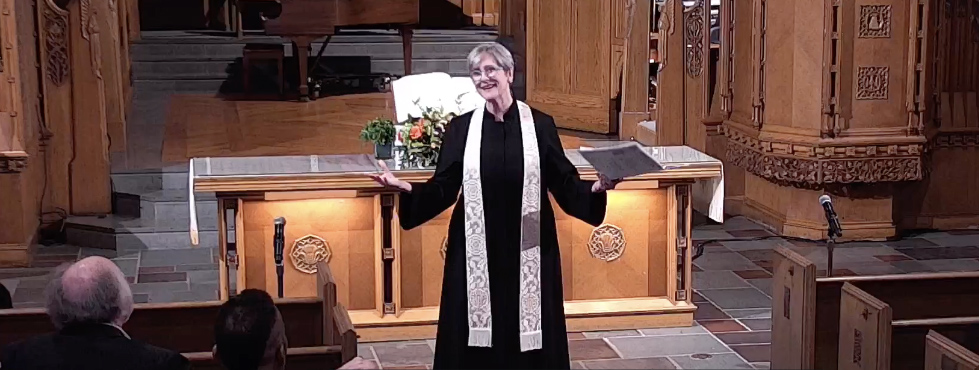Every pastor has certain Sundays they like more than others.
Christ the King Sunday is my least favorite Sunday. But I love Transfiguration Sunday. That’s the Sunday that falls right before the season of Lent. It’s the Sunday that concludes the season of Epiphany.
It’s typically the Sunday where we read the story of Jesus being transfigured on a mountaintop in front of his disciples, Peter and James and John. As the story goes, his face becomes radiant in glory and his clothes turn dazzling white. And then to make the moment all the more miraculous, Moses and Elijah appear out of nowhere. And then God speaks and says: “This is my Son, the beloved. Listen to him.”
 The whole thing is so amazing that when it’s over, Peter begs to stay there and offers to build shrines for everyone to live in.
The whole thing is so amazing that when it’s over, Peter begs to stay there and offers to build shrines for everyone to live in.
While the story of the transfiguration is an amazing one, I love this Sunday for more personal reasons: The first time I ever heard a female preacher was on Transfiguration Sunday. I remember it because the pastor, Julie Pennington-Russell, likened the moment of the transfiguration to the notion in Celtic spirituality of thin places. Places where the veil between heaven and earth is so thin, you don’t know what side of it you’re on. For the disciples on that mountain, she said, this was a thin place.
Little did she know that for me on that back pew, watching her was a thin place. In a 15-minute sermon, she expanded the horizons of my call exponentially, and I didn’t know what side of heaven or earth I was on. I just knew it was all holy ground.
“Little did she know that for me on that back pew, watching her was a thin place.”
This year on Transfiguration Sunday, our lectionary reading was not from the Gospel, but from the Hebrew Bible. It was the story of Elijah and Elisha.
This is a strange story: Elisha was the student of the prophet Elijah. Yes, it’s confusing because their names sound almost identical, but Elijah was the prophet, the teacher, and Elisha was the student, the apprentice.
Together these two went on a journey, and although three times Elijah tried to leave Elisha, Elisha wouldn’t let him. In fact, every time Elisha said to Elijah, “As the Lord lives, and as you yourself live, I will not leave you.” So through the towns of Gilgal, Bethel and Jericho, these two men went. And every time they arrived somewhere new, a group of folks said to Elisha, “Do you know that today the Lord will take your master away from you?” Which apparently he did.
Now eventually Elijah and Elisha made it to the Jordan, where Elijah took off his mantle, his cloak, rolled it up and struck the water, so it could be parted and they could cross on dry ground. Sound familiar? No wonder these figures — Elijah and Moses — show up together at the transfiguration of Jesus.
As the story continues, they crossed on dry ground and then Elijah asked Elisha, “What do you want me to do for you before I’m taken away?” Elisha said, “Give me a double share of your spirit.” The Hebrew words are actually “give me a double mouthful” — meaning, give me a second helping, a bellyful of your spirit.
Elijah told Elisha, “If you see me being taken away from you, it will be granted. But if you don’t, it won’t.” Then as they kept walking and talking, a chariot of fire and horses appeared and they took Elijah and he ascended in a whirlwind into heaven. The end.
Don’t you just love the Bible? This story is so bizarre and wild and interesting. What a strange, wonderful book this is.
I recently read that it’s not uncommon in synagogues for someone to show up wanting to convert to Judaism and for them to be turned away. In fact, many rabbis will send folks away three times. Only if they persist will they allow someone to prepare to convert. Perhaps the sending away is a way of discerning whether or not someone really is committed to the practice.
Perhaps Elijah was testing Elisha to see if he was really committed to the work of being a prophet. On the off chance that he had romanticized the task, perhaps Elijah wanted to see if Elisha was really willing to do what was and is demanded of a prophet. That would make sense, wouldn’t it?
“What they were doing was reversing Israel’s entry into the Promised Land.”
Now, here’s the next thing to notice, and it’s the most important. These men, together, traveled through three different towns, which may seem ancillary to you at first, but a closer read will show you that these cities were and are critical to the telling of this story. Gilgal, Bethel and Jericho are the cities Israel conquered coming into the Promised Land. Here in our story, Elijah and Elisha traveled these towns in reverse. In fact, what they were doing was reversing Israel’s entry into the Promised Land.
Israel had been failing to live up to the covenant God had made with them. Their kings were offering sacrifices to false gods, they’d been putting up pagan images for worship and breaking all kinds of covenant laws. So Elijah made his way through these towns, blasting the people for their transgressions and rolling back up Israel’s entry into the Promised Land. He was reversing it. He and Elisha were leaving.
When they got to the Jordan and crossed it, they did so in the reverse direction Joshua had done. Elijah rolled up his mantle, his cloak, so it looked like Moses’ staff, he then struck the river, split it in two like the Red Sea, and then together, with Elisha, they basically moonwalked out of Israel’s Promised Land. Reversing the whole order of how Israel first came in. Isn’t that interesting?
Elisha then asked Elijah, “What is that you want?” And Elisha boldly said, “I want double of what you have.”
Then, of course, there were the fireworks, the whirlwind, the chariots of fire. Hard not to notice those things. Elijah then got taken up, and Elisha cried after him and mourned. The end.
But if we were to keep reading, eventually Elisha stopped grieving and he picked up the same mantle Elijah used as a staff and he struck the Jordan again, like Elijah and like Moses, and what do you know? It split, and Elisha went back and re-entered the Promised Land.
Now that’s some rich imagery, isn’t it?
Reading this biblical story made me think of an experience that happened in our church since I came as pastor. It involves a 12-year-old girl, who gave me permission to tell her story.
It happened in our sanctuary on a Monday morning.
I have a habit every Sunday of leaving my sermon manuscript on the pulpit. Usually by midweek, a staff member will gather it and leave it on my office desk, but for at least a few days it sits right on the pulpit.
“This 12 year old girl lit the candles on the Communion table and read my sermon word for word from behind the pulpit.”
This young woman was here on a Monday morning when school was closed, and she found her way into the sanctuary where she happened upon my sermon. I don’t know what elicited her to do what comes next, but whatever the reason, this 12 year old girl lit the candles on the Communion table and read my sermon word for word from behind the pulpit.
Her grandfather thought he heard something coming from the sanctuary, so he popped his head in to watch her just as she was finishing. When she was done, he asked her, “How did that feel?” She was startled at first, because I’m sure she thought she was alone, but then she responded, “I liked it.”
When Harry Wooten shared this story with me, I was so moved, because again I was 19 years old before I saw a female preacher, and it was another three or four years after that before I stood behind a pulpit and when I did it was just to read the Scripture. But here this child, this young woman, at 12 years old broke the seal, whether she realized it or not, and stood behind the pulpit and delivered an entire sermon. And you know what? She liked it.
Transfiguration Sunday, the story of Elijah and Elisha, is about the future leaders of the church. The ones who will pick up the mantle and lead us back home modeling another way.
Sometimes things feel so out of whack when it comes to religion, the church and the Christian faith. Like the nation of Israel, we’ve lost our way. We’ve put up pagan images for our worship and made sacrifices to false gods.
There is so much we need to reverse, and it’s easy to get disheartened about the future of the church. But this story gives us hope. Hope that we can reverse what’s been done. Hope that there will then be others who will pick up the mantle and lead us back home, modeling another way.
According to the Scriptures, Elijah performed eight miracles and Elisha 16. Double. This isn’t about being better than a predecessor. It’s about hope for the future.
“We have a tendency to cherish the past so much that we fear the future.”
So often the church can be so deeply conservative, and by that I mean the church has a habit of always wanting to conserve the way things are. We have a tendency to cherish the past so much that we fear the future. But this is where the church can be radically hopeful. Maybe there can be a fresh start, a re-entry, that can help us get it right this time.
Eighteen years ago today, my life was transfigured. Meaning I was taken beyond the limitations of my own mind to imagine a broader future for myself. You cannot be what you cannot see.
I am a pastor today because of Julie Pennington-Russell and Calvary Baptist Church in Waco, Texas. There was a mantle left for me that morning to pick up so that I could part the waters of my own life and return home by another way.
We are always modeling for our communities and for our young people what’s possible with the hopes and the trust that they will do more than we did. And that’s reason for hope, because often things are full of so much gloom, we wonder what kind of world our children will inherit. But today, I wonder, what kind of world will they build?
Victoria Robb Powers serves as senior pastor of Royal Lane Baptist Church in Dallas. She is a graduate of Baylor University and Brite Divinity School and previously served in ministerial roles at University Park United Methodist Church and Highland Park United Methodist Church in Dallas. She chairs the board for the new Baptist House of Studies at Perkins School of Theology at Southern Methodist University.


